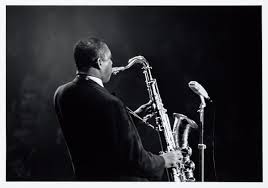
This Wednesday, September 23, marks the birthday of the great John Coltrane. He was born in 1926 which makes this his 89th birthday. Sadly, he died on July 17, 1967 at the age of only 40 years old. But what he accomplished in only 40 years!
He was born in Hamlet, North Carolina, and grew up in High Point, North Carolina. I recall a story of his childhood of a mean older girl on his street who would always steal his snacks. Sick of such treatment, young John decided to teach her once and for all.
He got two pieces of white bread and put dog poop between the bread. A sh#@ sandwich, if ever there was one. Sure enough, John walked down the street acting like he was enjoying the sandwich and, right on cue, the girl appeared and swiped his sandwich...for the last time.
In 1938, however, he lost his aunt, his grandparents and his father within a few short months, leaving him to be raised by his mother and a close cousin.
In 1943, the family moved to Philadelphia and in September, for his birthday, his mother bought him his first saxophone, an alto. No better gift could have given.
He served a year in the Navy from 1945-46 and was immediately recognized as a great talent and placed in the Navy’s jazz band. After his discharge, he returned to Philadelphia and was swept up by the music of Coleman Hawkins and Ben Webster. He studied music theory and was blown away by seeing Charlie Parker play.
Miles Davis was impressed by the young man, already being called Trane, and Coltrane was invited to join Dizzy Gillespie’s band. Most of the years until 1955, however, were spent freelancing. Then, in the summer of that year, Coltrane received a call from Miles Davis.
This version of Miles’ band was called “The First Great Quintet” and with Miles and Trane were Red Garland on piano, Paul Chambers on bass and Philly Joe Jones on drums. Both Miles and Trane had a tremendous effect on each other. That great band was together from 1955 until 1957 and broke up, some say, because John Coltrane had developed a heroin addiction.
Miles had always supported Trane the musician and defended his new approach to the tenor sax to which he had switched in 1948. But Miles had kicked his own heroin habit years before and would not tolerate it around him.
In a famous story, Miles kicked Trane off the railroad passenger car in the middle of nowhere and said, “I’ll find you when you’re clean.”
Thelonious Monk, a short time later, picked up Coltrane, dusted him off and set him in Monk’s great quartet with Ahmed Abdul-Malik on bass and Shadow Wilson on drums. Because of contractual complexities, they only recorded one studio album together.
However, on November 29, 1957, The Thelonious Monk Quartet featuring John Coltrane performed at a “Thanksgiving” Carnegie Hall concert benefiting the Harlem Community Center. Jazz journalists hailed the performance as one of the greatest quartet performances ever. The concert had been recorded by Voice of America but the tape was lost almost immediately after the concert.
A recording engineer named Larry Appelbaum began a search for the missing tape years—many years—later. Appelbaum searched through the Carnegie Hall archives, the Metropolitan Library and everywhere he could think. He eventually made his way to the Library of Congress in Washington, DC, where the tape had remained—safe and untouched—until 2005 when Appelbaum found it. The tape was restored by Michael Cuscuna and T.S. Monk, Thelonious’ son.
It was everything the journalists said it was. The restored recording was played on National Public Radio and I remember listening to it as if I were hearing an original recording of the Sermon on the Mount. Yeah, it was like that. It was later released as Thelonious Monk Quartet with John Coltrane at Carnegie Hall. Monk changed Trane in all the right ways.
Blue Train was released with Coltrane as the leader. It was one of the best albums of the era. It also showed what came to be known as “Coltrane changes.” It also began to show the “sheets of sound” character that Trane had developed in his short time with Monk.
In 1958, he indeed was found again by Miles Davis. Trane was clean and would be for the rest of his life. That was the kind of love that Miles had for him, to discipline him and push him—even to push him away for Trane’s own good. Monk found Trane and rescued him with another kind of love.
In 1958, Miles and Trane recorded Kind of Blue, a hugely important album under Miles’ leadership. The next year, Trane would release Giant Steps, his first album for Atlantic Records.
From that time until his death in 1967, John Coltrane grew to greater maturity as a musician and a composer and as a human being. His album A Love Supreme was released in 1964. For me, it is the greatest album ever. Nothing comes even close.
Among his contemporaries, he was a mentor and an innovator and a master of his craft. When he died, he was acclaimed a saint by the African Orthodox Church for his work in expressing the depth and breadth of the human spiritual experience.
I don’t sit and imagine what Coltrane would have done had he lived past 40 years of age. He had already done it all.
 RSS Feed
RSS Feed
